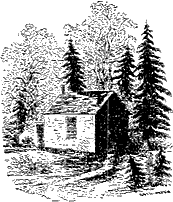
Drawing of Thoreau's cabin by his sister Sophia
Lesson 1: The life and times of Thoreau
Lesson 2: Thoreau's philosophy of government
Lesson 3: Thoreau's writing style
Lesson 4: Imprisonment and individuality
What do we owe to Thoreau?

In July of 1846, Thoreau spent a night in the
Concord jail for nonpayment of his poll tax. This experience would prompt
Thoreau to write the influential essay, "Civil
Disobedience." In it, he argues that the individual is never obliged to
surrender conscience to the majority or to the State. If a law "is of such
a nature that it requires you to be the agent of injustice to another," he
writes, "then, I say, break the law."
In this unit, students have an opportunity to study Thoreau's philosophy about
civil disobedience while critically analyzing this important literary work. Historical background information is researched online
and applied to understanding Thoreau's writing and activities. Online
quizzes, debates, and an e-mail assignment infuse the project with motivating
activities. Comparisons to current socio-political movements connect the unit to students'
own experiences.
Key concepts for discussion include:
- How does a single individual recognize what is wrong and what is right?
- At what point does a person's conscience carry more authority than the law?
- What is accomplished by acts of civil disobedience?
- What types of consequences would you be willing to suffer if you were involved in activism on an issue of concern to you?
Standards
Language Arts
- Responds to non-fiction using interpretive, critical, and evaluative processes
- Recognizes a range of literary elements and techniques such as figurative
language, dialect, and aphorisms.
- Articulates one of more perspectives to summarize arguments on different sides
of issues
- Develops an understanding of the diverse social, historical and cultural
dimensions of texts
- Produces work in at least one literary genre that follows the conventions
of the genre
- Reads and writes for critical analysis and evaluation
- Speaks to share information and ideas in small or large group discussions
- Uses strategies (such as discussing with others, reading aloud) to assist in
comprehension
- Uses correct grammatical construction
Civics
- Understands the importance to
individuals and society of such personal rights as freedom of conscience,
expression and association, freedom of movement and residence, and privacy
Historical Understanding
- Analyzes the values held by specific
people who influenced history and the role their values played in influencing
history
- Understands how the past affects our private lives and society in general
Technology
-Uses
technology to collaboratively locate information and to publish the results of
their research
-Uses technology applications to organize writing and survey the opinions of
peers.
-Communicates ideas effectively to a variety of audiences using multiple methods
of delivery.
-Interacts
with peers through technology applications